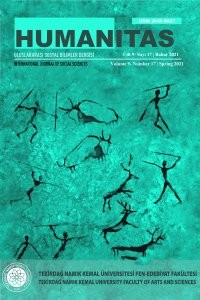Öz
This study focuses on Philip Ridley’s Mercury Fur (2005), a play which explores various meanings related to a physical labyrinth, memory as a maze, mirror/glass as a labyrinth, etc. The present study aims to disclose primarily the significance of the physical labyrinth, presented in Ridley’s play mostly as a radical space, a reminiscent of Foucault’s “heterotopia”, in which the characters cannot be domiciled, but are rather haunted, their inevitable entrapment creating a perpetual existential feeling of anxiety. This study also attempts to discuss the issue of memory as a maze, revealing the playwright’s concern for the precariousness of memory while the national or individual identities are pursued. In a space in which everyone and everything is manipulated, Ridley’s characters, in their struggle for survival, are forced to re-negotiate all the known thresholds of cruelty and transgression in order to discover the path leading them to humanness and morality.
Anahtar Kelimeler
Labyrinth heterotopia memory reality Philip Ridley Mercury Fur
Kaynakça
- Attinger, C. (2017). Staging Hobbes, or: Theseus goes to the theatre. Precariousness, cultural memory and dystopia in Philip Ridley’s Mercury Fur. In M. Aragay & M. Middeke (Eds.). Of precariousness: vulnerabilities, responsibilities, communities in 21st-century British drama and theatre (pp. 47-62). London: De Gruyter, Inc.
- Augé, M. (1992). Non-lieux. Introduction à une anthropologie de la surmodernité. Paris: Ed. Du Seuil.
- Baudrillard, J. (1994). Simulacra and simulation. Ann Arbor: University of Michigan Press.
- Everyman, R. (2004). The past in the present: culture and the transmission of memory. Acta Sociologica, 47(2), 159-169.
- Foucault, M. (2008). Of other spaces. In M. Dehaene & L. De Cauter (Eds.). Heterotopia and the city: public space in a postcivil society (pp. 13-29). London: Routledge.
- Fukuyama, F. (2002). Our posthuman future. Consequences of the biotechnology revolution. New York: Farrar, Straus and Giroux.
- Gane, M. (1991). Baudrillard: critical and fatal theory. London: Routledge.
- Golban, T. & Benli, D. (2017). The quest for an authentic self: memory and identity in Philip Ridley’s Mercury Fur. Border Crossing, 7, 305-316.
- Harpin, A. (2011). Intolerable acts. Performance Research, 16(1), 102-111.
- Kern, H. (2000). Through the labyrinth: designs and meanings over 5,000 years. New York: Prestel Publishing.
- Ricoeur, P. (2004). Memory, history, forgetting. Chicago: The University of Chicago Press.
- Schmitz-Evans, M. (2012). Mirror and Labyrinth. In G. Lehnert & S. Siewert (Eds.). Spaces of desire- spaces of transition: space and emotions in modern literature (pp. 15-27). Hamburg: Peter Lang.
- Sudradjat, I. (2012). Foucault, the other spaces, and human behaviour. Procedia - Social and Behavioral Sciences, 36, 28-34.
- Wyllie, A. (2013). Philip Ridley and memory. Studies in Theatre and Performance, 33(1), 65-75.
Öz
Anahtar Kelimeler
Philip Ridley Labirent heterotopya hafıza gerçeklik Kürklü Merkür
Kaynakça
- Attinger, C. (2017). Staging Hobbes, or: Theseus goes to the theatre. Precariousness, cultural memory and dystopia in Philip Ridley’s Mercury Fur. In M. Aragay & M. Middeke (Eds.). Of precariousness: vulnerabilities, responsibilities, communities in 21st-century British drama and theatre (pp. 47-62). London: De Gruyter, Inc.
- Augé, M. (1992). Non-lieux. Introduction à une anthropologie de la surmodernité. Paris: Ed. Du Seuil.
- Baudrillard, J. (1994). Simulacra and simulation. Ann Arbor: University of Michigan Press.
- Everyman, R. (2004). The past in the present: culture and the transmission of memory. Acta Sociologica, 47(2), 159-169.
- Foucault, M. (2008). Of other spaces. In M. Dehaene & L. De Cauter (Eds.). Heterotopia and the city: public space in a postcivil society (pp. 13-29). London: Routledge.
- Fukuyama, F. (2002). Our posthuman future. Consequences of the biotechnology revolution. New York: Farrar, Straus and Giroux.
- Gane, M. (1991). Baudrillard: critical and fatal theory. London: Routledge.
- Golban, T. & Benli, D. (2017). The quest for an authentic self: memory and identity in Philip Ridley’s Mercury Fur. Border Crossing, 7, 305-316.
- Harpin, A. (2011). Intolerable acts. Performance Research, 16(1), 102-111.
- Kern, H. (2000). Through the labyrinth: designs and meanings over 5,000 years. New York: Prestel Publishing.
- Ricoeur, P. (2004). Memory, history, forgetting. Chicago: The University of Chicago Press.
- Schmitz-Evans, M. (2012). Mirror and Labyrinth. In G. Lehnert & S. Siewert (Eds.). Spaces of desire- spaces of transition: space and emotions in modern literature (pp. 15-27). Hamburg: Peter Lang.
- Sudradjat, I. (2012). Foucault, the other spaces, and human behaviour. Procedia - Social and Behavioral Sciences, 36, 28-34.
- Wyllie, A. (2013). Philip Ridley and memory. Studies in Theatre and Performance, 33(1), 65-75.
Ayrıntılar
| Birincil Dil | İngilizce |
|---|---|
| Bölüm | Tüm Sayı |
| Yazarlar | |
| Yayımlanma Tarihi | 15 Mart 2021 |
| Yayımlandığı Sayı | Yıl 2021 Cilt: 9 Sayı: 17 |









